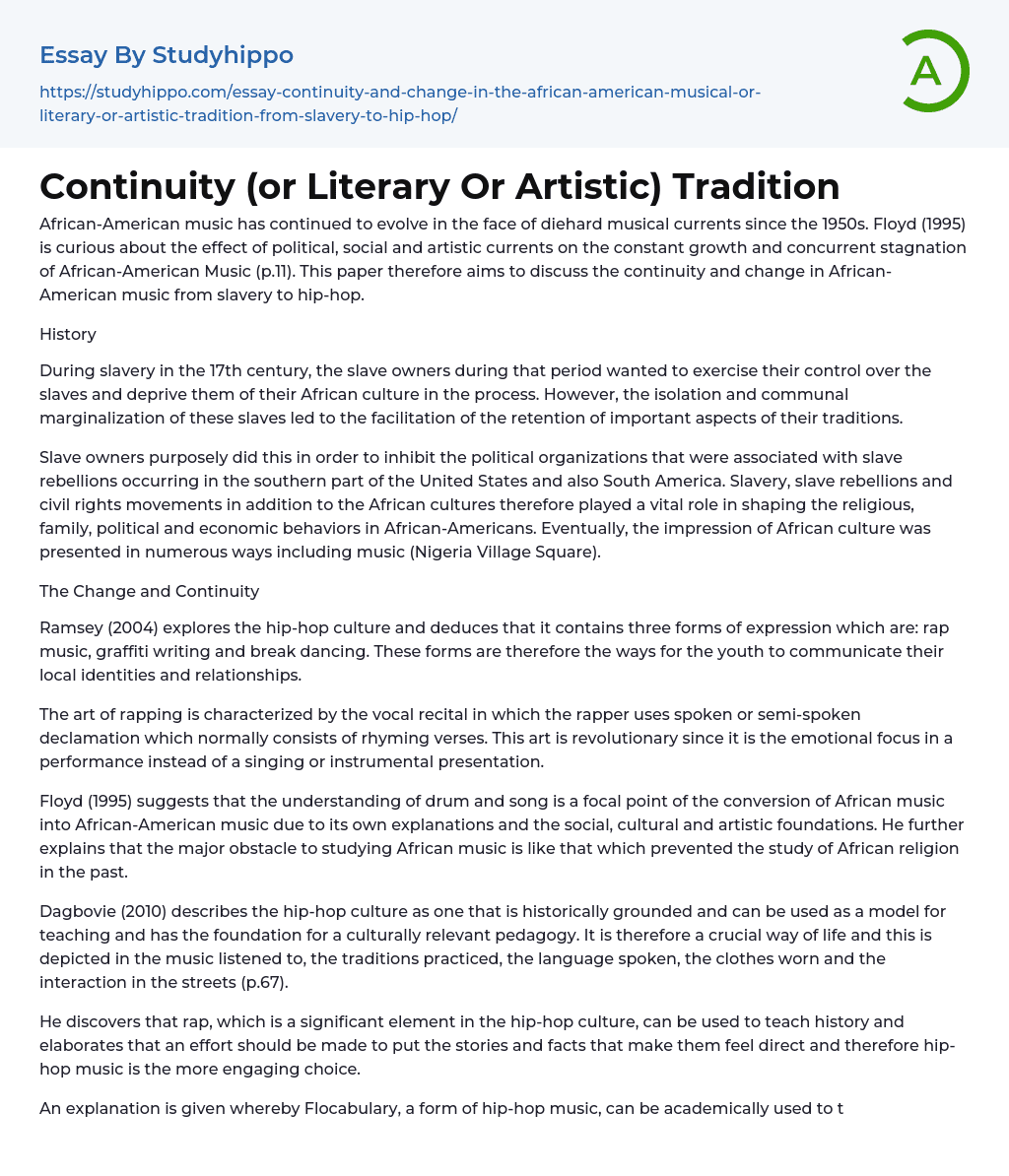In his 1995 study, Floyd explores how political, social, and artistic influences have affected the growth and occasional lack of progress in African-American music (p.11). This research intends to examine the continuous development and advancement of African-American music from its beginnings in slavery to the rise of hip-hop.
History
In the 17th century, slave owners aimed to control and eradicate African customs within slaves. Surprisingly, this isolation and exclusion safeguarded significant traditions within the enslaved community.
Slave owners in the southern United States and South America aimed to impede political organizations linked to slave uprisings, thus greatly influencing African-Americans' religious, family, political, and economic traditions through slavery, rebellions, civil rights movements, and African cultures. Over time, diverse expressions like music vividly portrayed the influence of African culture (Nigeria V
...illage Square).
The Change and Continuity
Ramsey (2004) states that the hip-hop culture includes different forms of expression such as rap music, graffiti writing, and break dancing. These forms allow the youth to express their local identities and relationships.
Rapping is the art of delivering rhyming verses through spoken or semi-spoken declamation. Unlike singing or playing an instrument, this form of expression emphasizes emotions in a performance.
Floyd (1995) argues that the importance of drum and song is crucial in the evolution of African music into African-American music. The significance lies in its explanations and its social, cultural, and artistic foundations. Furthermore, Floyd suggests that the study of African music has faced similar difficulties as the study of African religion in previous times.
According to Dagbovie (2010), the hip-hop culture has historical roots and can
serve as a model for teaching and a foundation for culturally relevant pedagogy. It is integral to one's way of life, encompassing music preferences, traditional customs, language usage, clothing choices, and street interactions (p.67).
The author suggests that rap, a crucial element of hip-hop culture, has the power to educate people about history. They emphasize the significance of presenting historical stories and facts in a relatable and immediate manner. Consequently, they contend that hip-hop music is a more engaging choice.
The text examines the educational potential of Flocabulary, a genre of hip-hop music, for students from diverse backgrounds. It proposes that by combining this musical style with positive messages and educational content, it can become an effective learning tool. The text also acknowledges various hip-hop lyricists such as Nas, Dead Prez, Common, Talib Kweli, and Mos Def who address African-American history in their songs.
Both historians of African-American culture and hip-hop lyricists, known as emcees, serve as modern day griots. They share the role of narrating past, present, and future events. Molefi Kete Asante emphasizes that visual styling in both characteristics and clothing is crucial to African American culture and Afrocentric symbolism.
In spite of this, many African-American historians who were born before the civil rights era believe that his method is ineffective and goes against the educational thoroughness that customary historians strive for (p.68).
Floyd (1995) examines how elements of African culture have influenced African-American culture. He discusses a dance where the dancer's trunk and pelvis, as well as the drummer's hands and sticks, demonstrate conflicting meters, showcasing bodily polyrhythm.
The African elements receive a balanced supply of
erotic stimuli from the twisting of the pelvis. This style was discovered to be used during slavery and now forms the foundation of the entire African-American tradition (p.27).
- Slave Trade essays
- Band essays
- Baroque Music essays
- Blues essays
- Classical Concert essays
- Classical Music essays
- Concert essays
- Hip Hop essays
- Jazz essays
- Ludwig Van Beethoven essays
- Michael Jackson essays
- Mp3 essays
- Music Concert Report essays
- Music Reference essays
- Music video essays
- Musical Instruments essays
- Opera essays
- Piano essays
- Popular music essays
- Recording essays
- Rock And Roll essays
- Rock Music essays
- Singing essays
- Sonata essays
- Song essays
- Sonnet essays
- Tupac shakur essays
- Abolitionism essays
- Adam Smith essays
- American History essays
- American Revolution essays
- Ancient Egypt essays
- Articles Of Confederation essays
- Atlantic Slave Trade essays
- Aztec essays
- Benjamin Franklin essays
- Civil Rights Act of 1964 essays
- Civil Rights Movement essays
- Civil war essays
- Cleopatra essays
- French And Indian War essays
- Gettysburg essays
- Great Depression essays
- Hurricane Katrina essays
- Industrial Revolution essays
- Jamestown essays
- Manifest Destiny essays
- Mccarthyism essays
- Patrick Henry essays
- Pearl Harbor essays




